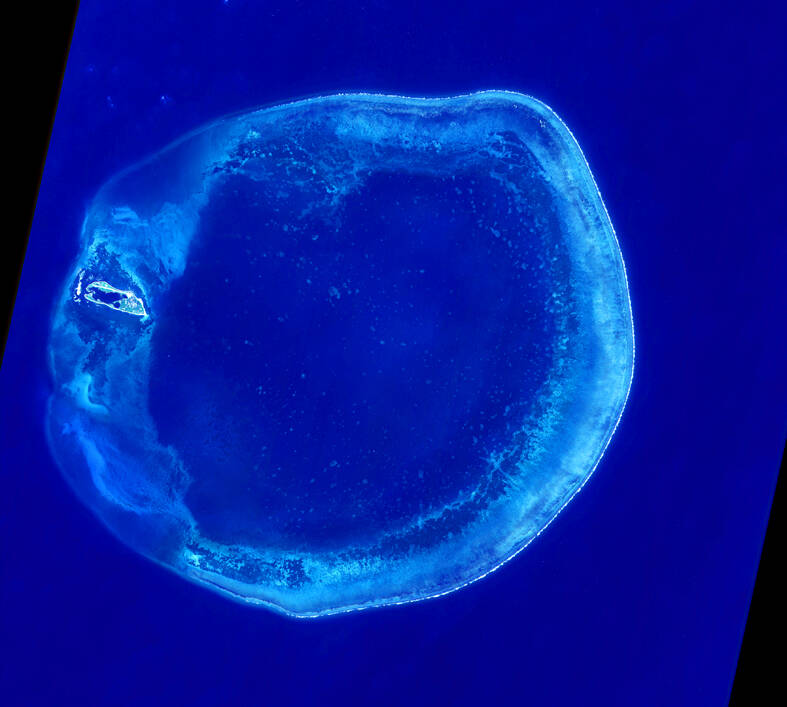The Coast Guard Administration (CGA) has so far this year expelled Chinese fishing vessels 77 times and detained six small boats for illegally entering restricted waters near the Pratas Islands (Dongsha Islands, 東沙群島), the agency said on Sunday.
The statement came a day after Academia Sinica Biodiversity Research Center chief executive officer Jeng Ming-shiou (鄭明修) said that the atoll, which is north of the South China sea and is rich in fishery resources, faces a severe threat from illegal fishing.
The Dongsha Atoll National Park, Taiwan’s first marine national park, prohibits all commercial and private fishing in the area to protect its rich and abundant marine population.

Photo courtesy of Jeng Ming-shiou
Jeng, who has led several diving teams to remove crown-of-thorns starfish that kill coral reefs in the area, said that last year he had seen Chinese fishers illegally enter restricted waters near the atoll and engage in cyanide fishing near coral reefs at night.
Cyanide fishing is the practice of spraying a sodium cyanide solution into an area to catch fish alive.
“These illegal Chinese fishing vessels mostly came from China’s Guangdong Province, and presumably they would ship the poisoned fishes to Guangdong or Hong Kong to sell,” Jeng said.
Cyanide might accumulate in the bodies of people who often consume fish caught with the toxic chemical, increasing their risk for liver disease or cancer, while seawater contaminated by cyanide could cause fish in an area to disappear over a few years, destroying the marine ecosystem, he said.
The CGA has been enforcing the fishing ban in the area, but fishing vessels are difficult to guard against, Jeng said.
Sometimes vessels are escorted by China Coast Guard ships, and some park larger vessels outside the restricted waters and use smaller boats to engage in cyanide fishing, he added.
In March 2016, the CGA stopped the Chinese vessel Ching Ching Fishing 05055 south of the Pratas Islands, finding three green sea turtles, 15,000kg of coral, 400kg of giant clams and six Triton snail (Charonia tritonis) shells, as well as 40kg of toxic chemicals onboard, Jeng and news reports at the time said.
As little human activity occurs in the Pratas Islands, coral cover in nearby waters has been as high as 60 to 80 percent, but the corals are under threat from an outbreak of crown-of-thorns starfish in the past few years, he said.
Triton snails are natural predators of crown-of-thorns starfish, but their population has fallen in part due to fishing, making crown-of-thorns starfish outbreaks more serious, he said.
Illegal fishing is the main cause of environmental damage near Dongsha Atoll, and the China Coast Guard should not be aiding illegal fishing vessels, he said.
The CGA has deployed larger vessels to patrol waters near Dongsha Atoll, and using multipurpose boats of the squad deployed on the island, it is protecting the area and closely monitoring the movements of Chinese vessels, to defend the nation’s sovereignty and ensure the sustainable development of marine resources in the area.

STATS: Taiwan’s average life expectancy of 80.77 years was lower than that of Japan, Singapore and South Korea, but higher than in China, Malaysia and Indonesia Taiwan’s average life expectancy last year increased to 80.77 years, but was still not back to its pre-COVID-19 pandemic peak of 81.32 years in 2020, the Ministry of the Interior said yesterday. The average life expectancy last year increased the 0.54 years from 2023, the ministry said in a statement. For men and women, the average life expectancy last year was 77.42 years and 84.30 years respectively, up 0.48 years and 0.56 years from the previous year. Taiwan’s average life expectancy peaked at 81.32 years in 2020, as the nation was relatively unaffected by the pandemic that year. The metric

Taiwan High Speed Rail Corp. (THSRC) plans to ease strained capacity during peak hours by introducing new fare rules restricting passengers traveling without reserved seats in 2026, company Chairman Shih Che (史哲) said Wednesday. THSRC needs to tackle its capacity issue because there have been several occasions where passengers holding tickets with reserved seats did not make it onto their train in stations packed with individuals traveling without a reserved seat, Shih told reporters in a joint interview in Taipei. Non-reserved seats allow travelers maximum flexibility, but it has led to issues relating to quality of service and safety concerns, especially during

A magnitude 5.1 earthquake struck Chiayi County at 4:37pm today, the Central Weather Administration (CWA) said. The hypocenter was 36.3km southeast of Chiayi County Hall at a depth of 10.4km, CWA data showed. There were no immediate reports of damage resulting from the quake. The intensity of the quake, which gauges the actual effect of a seismic event, measured 4 in Chiayi County, Tainan and Kaohsiung on Taiwan's seven-tier intensity scale, the data showed. The quake had an intensity of 3 in Chiayi City and Yunlin County, while it was measured as 2 in Pingtung, Taitung, Hualien, Changhua, Nantou and Penghu counties, the data

The Supreme Court today rejected an appeal filed by former Air Force officer Shih Chun-cheng (史濬程), convicted of Chinese Communist Party (CCP) espionage, finalizing his sentence at two years and two months for contravening the National Security Act (國家安全法). His other ruling, a ten-month sentence for an additional contravention, was meanwhile overturned and sent to the Taichung branch of the High Court for retrial, the Supreme Court said today. Prosecutors have been notified as Shih is considered a flight risk. Shih was recruited by Chinese Communist Party (CCP) intelligence officials after his retirement in 2008 and appointed as a supervisor